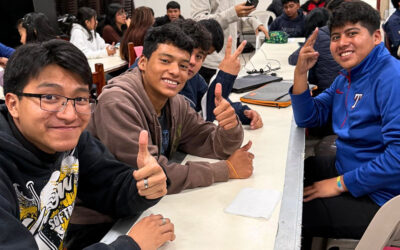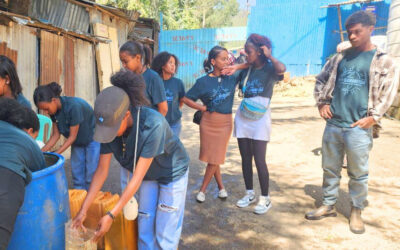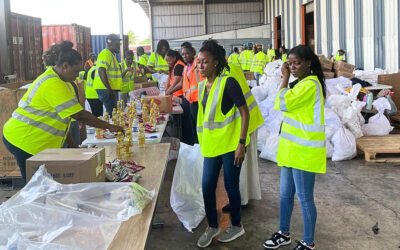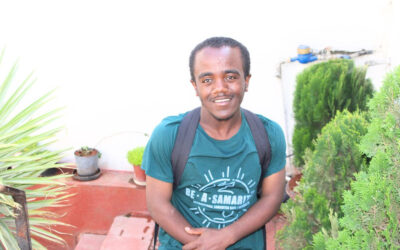
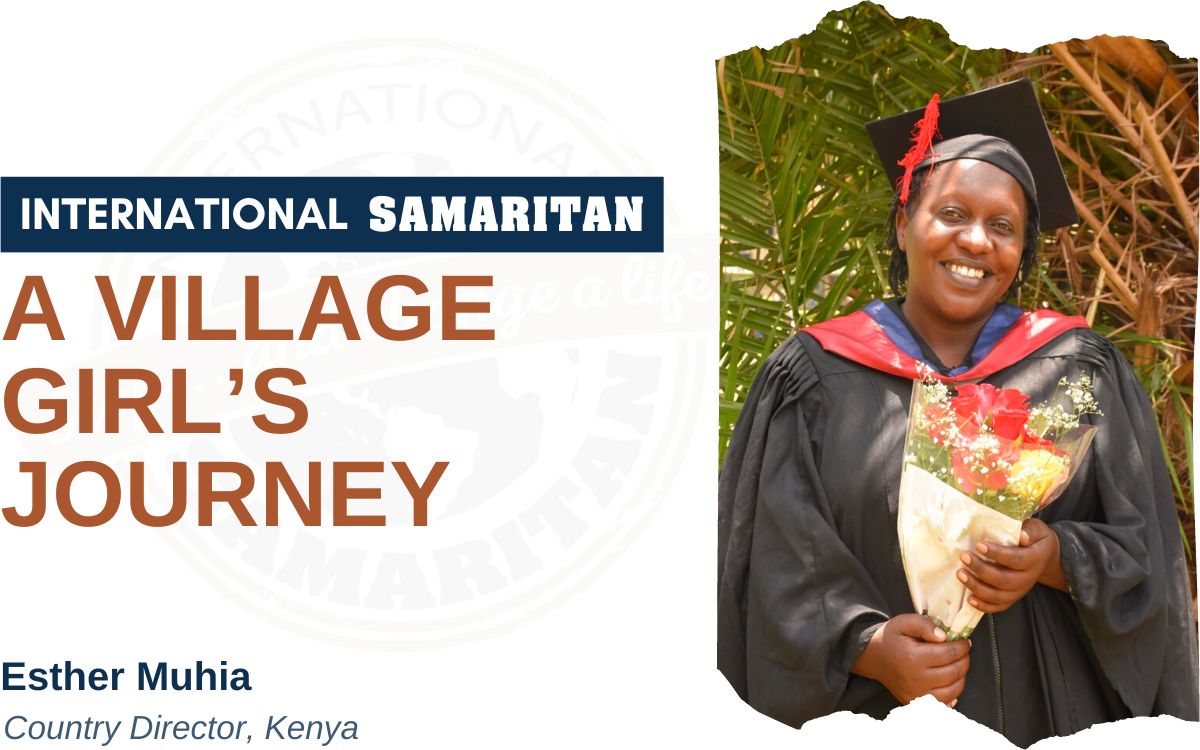
I am living proof that the dreams of each of our Samaritan Scholars are valid. I was raised in a village in Kenya, the eleventh born in a family of twelve siblings. For us, struggle was the order of the day.
My elderly parents were not educated. They were staunch Christians, and we trusted God daily for provision. My father was a butcher man, and my mother a farmer. The size of our land was slightly below three acres to provide for our big family. I grew up picking tea leaves, and helping with the goats, chickens, and cow. I burned wood to make charcoal and any other farm-related tasks that would help our parents make ends meet. Child labor was just a term then: we worked long hours on the farm till late evening after school.

Esther, (left) without shoes, with her classmate
after finishing her class eight exams.
When I was young, there were not many left-handed children. When I first went to school, my mother noted that I was left-handed and requested that the teacher train me to write using my right hand.
Mrs. Karanja, my class one teacher, took time to explain to my mother that it was okay to use my left hand. She highlighted examples of prominent people who used their left hand and were successful. Mrs. Karanja became my guardian angel. She corrected me with love, gave me extra books to read, cheered me on, and guided me through my education.

Esther (left) with her class teacher in high school, Mrs. Njue.
Though our parents were not educated, they loved and encouraged us as they taught us the dignity of hard work. When we finished a school term, my father, who could not read or write, asked us to read the report form and explain if we had good grades or not. Later, he would remind us that he did not go to school because his parents did not know the importance of education. He challenged us to work hard and get white-collar jobs and not labor on farms.
For several years, we were four siblings in high school. Every time we brought home the fee structure during holiday, my father asked us to give the total amount, and his exclamation always was, “God will provide.” In the evening, as we did our prayer together after the hard labor, we trusted God for provision. Indeed, God provided.
Part of that provision came from my elder siblings. They sacrificed their dreams and contributed to my high school education. When I was about to enter the university, my father had a stroke. This crushed my hopes, once again. I drew my strength from working hard on the farm with hopes that we would get resources to pay for fees. Then my elder siblings stepped in with support.

Esther (left) with her mentor Caren Wakoli
while studying at the University of Nairobi.
Growing up in the village, I had not been to the city. Attending the university located in the city was a tall order! Again, with the help of my elder sister, I was able to enter the university and settle. As I was trying to adjust and cope with city life, I met my mentor, Caren Wakoli. Caren mentored me starting that first year, and then she continued to expose me to both national and international educational opportunities.
My parents, elder siblings, teachers, church, mentors, and community contributed to who I am today. I received financial support, discipline and correction, mentorship, and spiritual guidance and counseling from all those people who desired to see me grow. They were my Samaritans. They helped me become who I am today.
As I interact with our Samaritan Scholars, I see my life many years ago. I am confident that through your support, one day each of them will write a beautiful triumphant story that will bear your name.

Esther Muhia
Country Director, Kenya
Esther’s education is in sociology, communication, and gender and development studies. She has worked in several leadership roles in Nairobi, Kenya, including at the Catholic Medical Mission Board. She has worked with NGOs and community and global organizations. Esther has successfully implemented various programs, including family and parent skills development, school-based mentorships and scholarships, economic empowerment, psychosocial support, and gender-based violence prevention programs.
On Love and Marriage
My grandmother, Catherine Gill, died 93 years ago this week—one week after giving birth to my dad....
Giving Blessings
In the Bible, people pushed through crowds to see Jesus. They left their homes to follow Him. They...
Jamaica Will Rise Again
At my teacher's college last fall, one of my professors lectured about what it means to be a good...
Dust Took My Sight
My name is Mikias. I was born and raised in Gojjam, in a remote Ethiopian village called Wadal. I...
The Joy That Unites Us
Here in Villa Guadalupe, it is a season full of color, street lights, nativity scenes in homes,...
The School Dress
We have a unique gift idea for you to share this Christmas. You can now go to Amazon and buy The...

